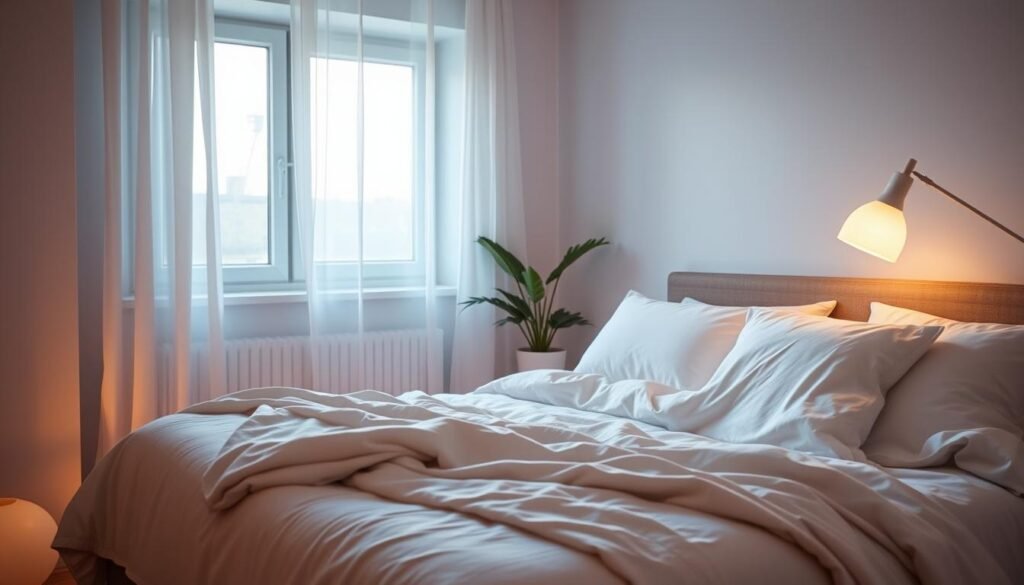Nearly one out of three people face acute insomnia every year. It’s a top sleep problem today. Sudden onset insomnia hits without warning, making it tough to sleep. This issue can mess up someone’s everyday life big time. It not only hurts our health but also makes us tired during the day, hard to focus, and more likely to have accidents. As more people face this problem, it’s critical to know why it happens. This knowledge is a key step towards fixing sleep troubles.
To tackle sudden onset insomnia, it’s vital to understand its causes. By knowing the underlying issues, one can look into different ways to deal with insomnia. There are many actions to take, from changing habits to seeking medical advice. Getting to the root of sleep problems empowers us. It lets us improve our sleep habits and overall health.
Key Takeaways
- Sudden onset insomnia affects almost a third of the population each year.
- This condition can have serious impacts on daily life and overall health.
- Effective treatment options range from lifestyle adjustments to medical solutions.
- Understanding individual insomnia triggers is crucial for managing symptoms.
- Good sleep hygiene can help alleviate insomnia for a majority of affected individuals.
Understanding Sudden Onset Insomnia
Sudden onset insomnia means you can’t sleep well suddenly, which is unusual for you. This problem is a kind of short-term insomnia. It impacts 10 to 15 percent of people, and each year, up to 30 percent may face it once. Symptoms include trouble getting to sleep, waking up often, and feeling very tired during the day.
Many things can cause this issue. Health problems, changes in your life, and feeling stressed or anxious are big reasons. In fact, anxiety or depression is linked to sleep issues in up to 90 percent of cases. Also, worrying too much about sleep can make things worse.
Certain long-term health issues, like restless legs or sleep apnea, might go along with insomnia. It’s important to understand these links to get better. Getting help from a professional, like through cognitive behavioral therapy, helps fix sleep misunderstandings and improve insomnia.
If you know you have sudden onset insomnia, you can start to fix it. Making changes can really help you sleep better. This cuts down on its bad effects on your health. For more tips on dealing with this, check out how to tackle sudden onset insomnia.
Common Symptoms of Sudden Onset Insomnia
Sudden onset insomnia can greatly affect your day-to-day life. Knowing its common symptoms is key to dealing with its challenges. These signs show up in many ways and can cause both tiredness during the day and troubles with sleep at night.
Difficulty Falling Asleep
Many people find it hard to fall asleep. Often, they lie awake for a long time. This initial battle not only makes it take longer to fall asleep but also raises anxiety about bedtime. This creates a stressful cycle, making the problem worse.
Frequent Nighttime Awakening
Waking up often during the night is another common issue. People may wake up several times, which breaks up their sleep. These interruptions stop them from resting well, leaving them feeling tired and confused when they wake up.
Extreme Daytime Tiredness
Because of disturbed sleep, people often feel very tired during the day. This tiredness harms both thinking and feelings. Issues like less work done, quick to anger, and hard to focus can arise. It’s crucial to recognize and tackle these symptoms to better your life.
Causes of Sudden Onset Insomnia
Many factors can kickstart sudden insomnia. It’s vital to know these to tackle sleep troubles effectively. Stress, hormonal shifts, and where you sleep play big roles.
Stress and Anxiety Disorders
Stress can mess with your sleep, especially during big life changes. Mental health issues like anxiety also make sleeping hard. In fact, over half of insomnia cases are linked to such problems.
Pandemic Hormonal Changes
Hormonal changes are a big deal too. Pregnancy can shake up sleep for almost 80% of women. Shifts during menopause or thyroid issues also throw off sleep, leaving you restless.
Environmental Factors
Your sleep setting matters a lot. Noise, too much light, or a bad bed can keep you awake. Shifts in your surroundings or new sleeping places can also disrupt sleep.
| Cause | Details | Statistics |
|---|---|---|
| Stress and Anxiety Disorders | High-pressure situations and mental health disorders can initiate sudden insomnia. | More than 50% of cases linked to mental health issues. |
| Hormonal Changes | Fluctuations in hormones can significantly impact sleep quality. | 78% of pregnant women report sleep difficulties. |
| Environmental Factors | Unpleasant sleep settings lead to continual disturbances. | Noise and temperature issues commonly cause insomnia in affected individuals. |
How Lifestyle Habits Impact Sleep
Lifestyle habits are key to good sleep quality. They greatly affect the chance of having sudden onset insomnia. By knowing which behaviors influence sleep hygiene, people can enhance their sleep health.
Caffeine and Alcohol Consumption
Caffeine is known to disrupt sleep. Drinking it too close to bedtime can make falling asleep hard. Although alcohol may seem like a sleep helper, it can actually ruin sleep later in the night. This results in poor sleep quality. Knowing the effects of caffeine and alcohol is vital for good sleep.
Irregular Sleep Schedule
Keeping a regular sleep schedule helps your well-being. Changing sleep times often messes with your body’s clock. This can make getting a good night’s sleep hard, worsening insomnia. A consistent daily routine supports better sleep habits, leading to more restful nights.

| Lifestyle Factors | Positive Impact on Sleep | Negative Impact on Sleep |
|---|---|---|
| Caffeine Consumption | Moderation can enhance alertness during the day | High intake before bed disrupts sleep initiation |
| Alcohol Consumption | May induce drowsiness initially | Leads to fragmented nighttime sleep |
| Sleep Schedule Regularity | Facilitates improved sleep hygiene | Irregular patterns confuse the body clock |
| Nutritious Diet | Supports overall health and better sleep quality | Poor nutrition associated with shorter sleep durations |
Changing lifestyle habits can lead to better sleep. It might also help reduce problems linked to sudden onset insomnia.
The Role of Medications in Sleep Disruption
Medications can disrupt sleep, leading to sudden trouble falling asleep. It’s important to know how they affect our sleep. Many medicines can make sleep worse.
Common Medications That Cause Insomnia
Some medicines cause sleep problems. Here are a few:
- Opioids: These can change sleep patterns and cause sleep apnea.
- Stimulants: Used for ADHD, they may make it hard to fall asleep.
- Corticosteroids: These can make you restless and mess with your sleep.
- Alpha-blockers: They might reduce REM sleep, affecting memory and feelings.
Using opioids with acetaminophen or ibuprofen may help sleep better. If alpha-blockers cause sleep issues, 5-alpha-reductase inhibitors could help. Knowing about drugs that affect sleep is key for those with sleep problems.
Managing Medication Side Effects
If medication affects your sleep, talk to a doctor. They might adjust your doses or when you take stimulants. For example, glucocorticoids can lower melatonin, raising the chance of insomnia. Usually, sleep issues from steroids are mild but can get worse with higher doses or long-term use.
For more help with sleep problems due to medication side effects, a medical expert can give personalized advice for better sleep.
Underlying Medical Conditions Linked to Insomnia
It’s vital to know how certain health problems can make sleep hard. Many conditions, like issues with the thyroid and chronic pain, affect not just health but also sleep. This can lead to ongoing insomnia.
Thyroid Issues and Insomnia
Thyroid problems can show up in two ways, impacting sleep differently. Hyperthyroidism often leads to anxiety and restlessness, making sleep hard. On the other hand, hypothyroidism can make you feel too tired, messing up your sleep routine. Tackling these thyroid issues can help improve sleep, showing why it’s key to manage these conditions well.
Impact of Chronic Pain
Chronic pain heavily affects sleep too. For example, arthritis can cause joint pain that keeps you from sleeping well. Other chronic pains, like migraines, wake you up often, ruining your sleep pattern. It’s crucial to control chronic pain to sleep better. Studies show that about 75% of people with fibromyalgia have trouble sleeping, underscoring how pain affects rest.
| Condition | Sleep Impact |
|---|---|
| Thyroid Dysfunction | Anxiety and restlessness affecting sleep |
| Arthritis | Joint pain leading to sleep disruption |
| Fibromyalgia | Severe sleep disturbances in up to 75% of cases |
| Chronic Pain | Difficulties in finding comfortable sleeping positions |
Insomnia often comes with other health issues, showing we need to look at the whole picture in treatment. Knowing the root causes of poor sleep can lead to better treatment plans. For more details on how health problems affect sleep, read more here.
Circadian Rhythm Disturbances
Circadian rhythm disturbances hurt how well we sleep. Our body has an internal clock that helps us feel awake or sleepy. This clock depends on the light and darkness around us. When this routine breaks, it can lead to trouble sleeping. Knowing how our body clock works helps us tackle sleep problems. This is very true for people who work shifts.
Understanding Circadian Rhythms
The suprachiasmatic nucleus, or SCN, keeps our circadian rhythms going even without any cues from outside. It’s a tiny area in our brain with about 20,000 neurons. These rhythms affect many things in our body. Light is key in controlling our sleep patterns. It influences melatonin, which is a sleep hormone. If our natural sleep cycle gets thrown off, we might face sleep disorders.
Shift Work and its Effects on Sleep
Working in shifts brings problems with our sleep routine. Shift workers often struggle to change their sleep times. This can lead to shift work insomnia. Research shows that one in three shift workers might have Shift Work Sleep Disorder. This increases their chances of having accidents or health problems. They often feel very sleepy or can’t sleep well, which can lower their productivity. To manage these issues, we need to look at biological, behavioral, and environmental factors.
Strategies to Improve Sleep Hygiene
Improving sleep hygiene is crucial for people struggling with insomnia. It can greatly improve sleep quality and health. It involves making your sleeping area better and keeping a regular bedtime.
Creating a Sleep-Friendly Environment
Making your bedroom better for sleep is key. It should be dark, quiet, and cool. That helps you rest better. Here’s how to improve your sleeping space:
- Use blackout curtains to block external light.
- Install a white noise machine to drown out distracting sounds.
- Keep the room at a comfy temperature, between 60 to 67 degrees Fahrenheit.
- Make sure your bed is comfy and supports your body well.
Establishing a Consistent Sleep Routine
Having a regular sleep schedule tells your body when to relax. It strengthens your natural sleep pattern. Here are some ways to keep a steady routine:
- Go to bed and get up at the same time every day.
- Stay away from caffeine and alcohol before bed.
- Do relaxing things before bed, like reading or meditating.
- Keep naps short, 20-30 minutes, and not too late in the day.

Natural Remedies for Sudden Onset Insomnia
Many folks with sudden insomnia search for natural solutions to sleep better. They use herbal supplements and relaxation tips. These methods help calm the mind and ensure restful sleep.
Herbal Supplements and Their Benefits
Herbal supplements offer relief to many. Here are a few popular ones:
- Valerian root: This herb helps you relax and fall asleep faster. You should take 400 to 900 mg before going to bed.
- Chamomile: It improves sleep quality, helping older adults with insomnia.
- Melatonin: Taking 1 to 5 mg can adjust your sleep cycle, helping those with cancer-related sleep issues.
- Lavender oil: Using around 80 mg for aromatherapy pairs well with good sleep habits.
For more on natural sleep aids, see natural sleep solutions.
Relaxation Techniques
Pairing herbal aids with relaxation methods boosts sleep quality. Here are some effective techniques:
- Meditation: Daily meditation has been shown to enhance sleep patterns if done weekly.
- Deep breathing exercises: These help relax your mind and body, easing you into sleep.
- Gentle yoga: Regular yoga can lessen insomnia symptoms.
- Massage therapy: It’s reported that massages can better sleep by addressing daytime tiredness linked to insomnia.
Mixing relaxation activities with herbal supplements can be quite effective. If you’re tackling sudden insomnia, try adding these strategies to your night routine.
Psychotherapy and Sleep Treatment Options
Insomnia is a problem for many adults, with 10% to 30% affected. Getting psychotherapy for insomnia, especially Cognitive Behavioral Therapy for Insomnia (CBT-I), can help. This type of therapy works by changing the thoughts and actions that make sleep difficult.
Cognitive Behavioral Therapy for Insomnia (CBT-I)
CBT-I is highly recommended for fighting chronic insomnia. It helps people change their behavior and the way they think about sleep. Part of the therapy involves creating better sleep habits, like:
- Creating a consistent bedtime routine
- Setting realistic sleep limits
- Reducing caffeine intake
- Improving the sleep environment
The therapy usually lasts for 6 to 8 sessions, depending on what the person needs. Techniques include learning to relax, biofeedback, and staying calmly awake to tackle insomnia. Studies prove that CBT-I is effective for a long time and doesn’t have the bad side effects of sleeping pills.
When to Seek Professional Help
If your insomnia lasts more than three months, it’s time to ask for help. This is especially true if it’s affecting your day-to-day life or comes with other symptoms. Although not all doctors specialize in sleep, groups like the American Academy of Sleep Medicine can connect you with experts.

CBT-I offers a way to fix your sleep schedule and decrease anxiety about sleeping. Getting enough sleep is essential for staying healthy and feeling good.
Medical Treatments for Insomnia
For those dealing with chronic insomnia, finding the right medical treatment is key to getting good sleep. There are a lot of options that can help, both medicines and non-medicine ways.
Prescription Medications
Doctors can prescribe different kinds of medications to help with insomnia. Here are some you might know:
- Benzodiazepine sedatives: These can help you fall asleep but might be habit-forming if used too long.
- Non-benzodiazepine sedatives: These are similar to benzodiazepines and help with starting and keeping sleep.
- Orexin receptor antagonists: Drugs like Belsomra and daridorexant work by changing orexin’s action in the brain, which is part of how we sleep and wake.
- Antidepressants: For those with depression, some antidepressants can also help with sleep problems.
- Ramelteon (Rozerem): This drug is unlikely to make you feel sleepy in the morning or become addictive, which makes it a good choice for many.
These medications are there to make your sleep better. But, it’s important to use them as your doctor suggests to avoid any risks.
Alternatives to Medicinal Treatments
Some people prefer not to take medication for their sleep problems. Instead, they look for other ways to improve their sleep. There are effective strategies like:
- Breathing exercises: Doing breathing exercises can help calm you down, make you less anxious, and help you sleep better.
- Moderate exercise: Working out a few times a week can really improve how well you sleep.
- Mind/body techniques: Things like meditation and yoga can take away stress and help you sleep more soundly.
- Good sleep habits: Keeping your bedroom dark and quiet, not eating big meals late, and sticking to a sleep schedule can also improve your sleep.
These non-medicine approaches can be great alongside medicine to tackle the reasons behind insomnia and help with long-term sleep health.
| Treatment Type | Description | Potential Risks |
|---|---|---|
| Benzodiazepines | Induces sleep, effective for many | Risk of addiction with long-term use |
| Non-benzodiazepines | Helps initiate and maintain sleep | Addiction potential similar to benzodiazepines |
| Orexin Receptor Antagonists | Modifies action of orexin | Limited information on long-term effects |
| Antidepressants | Used in patients with depression | May cause side effects unrelated to sleep |
| Ramelteon | Less likely to cause sleepiness/morning grogginess | May be less effective for some individuals |
Conclusion
Understanding what causes sudden insomnia is key for anyone looking for ways to fight it. Many people, up to two-thirds, face insomnia occasionally due to lifestyle, environment, and health issues. With 10% to 15% suffering from chronic insomnia, it’s critical to spot and deal with sleep problems early.
Good sleep hygiene can vastly improve your sleep quality. This includes sticking to a regular bedtime and making your bedroom comfy for sleep. Using natural remedies and relaxation methods also helps. These steps can lower stress and anxiety, leading to better sleep.
If insomnia keeps bothering you, it’s important to get professional help. Treatments like CBT-I are very effective for long-term insomnia. Taking steps to understand and tackle insomnia lets people enjoy good sleep. This means better days, improved health, and a happier life.